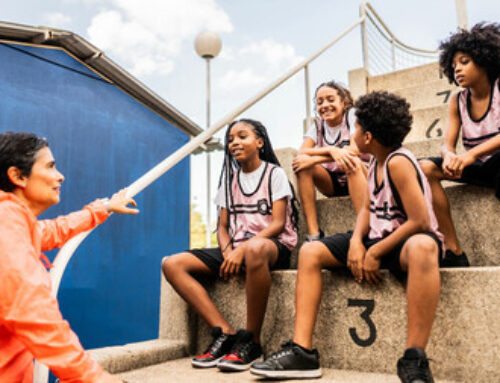How to Use Social Media to Get College Coaches to Notice You (For the Right Reasons)

The synergy between social media and college recruiting continues to grow. Social media is evolving into the primary tool of communication between prospects and college coaches. If used prudently, these high tech platforms can help streamline evaluations significantly to help college coaches recruit best.
RELATED: 3 Tips for Writing a Strong College Recruiting Mission Statement
On the flip side, it is important for prospects and families to realize that social media sites are “public platforms,” where information and opinions can directly define a prospect’s core character and values.
Social media and the accelerated pace of college recruiting are two strands of the evolution, and they are merging into a streamlined communication platform.
Facebook, Instagram, Twitter and Google are valuable places to share your personal story. That aside, the substance and tone of your postings will define you in the eyes of college coaches.
Think of social media as an opportunity to make your personal statement to both the public and to college coaches. Envision each post as an individual thread that helps weave your college recruiting experience into a seamless and comprehensive package.
RELATED: Recruiting Advice From 8 Former NCAA Division I Athletes
Inspire your followers with positive messages and experiences, and avoid using social media to express irresponsible and potentially damaging opinions.
- Introduce yourself.
- Share your college mission statement and goals.
- Identify your glorious moments and success stories.
- Do not be afraid to share your failed moments.
- Demonstrate the importance of team and loyalty to your coaches.
Prospects rarely realize the potentially severe consequences of ill-advised material on social media. In today’s high tech society, everything you communicate is out there for people to see, and recruits need to be vigilant about vetting the information they share, especially the ways in which they respond to critics. I offer the following points as an informal reference guide:
- Everything you put on the internet is easily shared and therefore “permanent.”
- Understand the potential repercussions before sharing your opinions.
- Carefully review any photos or videos you plan to post which even remotely degrade your character or personality.
- Use a communication coach (mom, dad, club coach) to review your posts before they go live.
High school athletes are being observed and evaluated on several complex levels, and college coaches are using social platforms to get inside the minds, spirits and emotions of their prospects. This should serve as an important reference to boys and girls who regularly navigate social media sites.
RELATED: The Responsibilities of Student-Athletes in Recruiting
Make an effort to keep your posts positive. Share messages that take the “high road” and that can serve as an inspiration for younger student-athletes. Avoid using social media as a sounding board to debate reckless viewpoints. Keep anything remotely negative to yourself.
Social media and constantly changing communication technology and strategies are huge parts of the new landscape of college recruiting, allowing prospects and coaches to connect instantaneously. That being the case, savvy student-athletes will take great care in organizing and managing their social media communications in ways that will impress college coaches—and they will do so in a positive and responsible manner.
[cf]skyword_tracking_tag[/cf]RECOMMENDED FOR YOU
MOST POPULAR
How to Use Social Media to Get College Coaches to Notice You (For the Right Reasons)

The synergy between social media and college recruiting continues to grow. Social media is evolving into the primary tool of communication between prospects and college coaches. If used prudently, these high tech platforms can help streamline evaluations significantly to help college coaches recruit best.
RELATED: 3 Tips for Writing a Strong College Recruiting Mission Statement
On the flip side, it is important for prospects and families to realize that social media sites are “public platforms,” where information and opinions can directly define a prospect’s core character and values.
Social media and the accelerated pace of college recruiting are two strands of the evolution, and they are merging into a streamlined communication platform.
Facebook, Instagram, Twitter and Google are valuable places to share your personal story. That aside, the substance and tone of your postings will define you in the eyes of college coaches.
Think of social media as an opportunity to make your personal statement to both the public and to college coaches. Envision each post as an individual thread that helps weave your college recruiting experience into a seamless and comprehensive package.
RELATED: Recruiting Advice From 8 Former NCAA Division I Athletes
Inspire your followers with positive messages and experiences, and avoid using social media to express irresponsible and potentially damaging opinions.
- Introduce yourself.
- Share your college mission statement and goals.
- Identify your glorious moments and success stories.
- Do not be afraid to share your failed moments.
- Demonstrate the importance of team and loyalty to your coaches.
Prospects rarely realize the potentially severe consequences of ill-advised material on social media. In today’s high tech society, everything you communicate is out there for people to see, and recruits need to be vigilant about vetting the information they share, especially the ways in which they respond to critics. I offer the following points as an informal reference guide:
- Everything you put on the internet is easily shared and therefore “permanent.”
- Understand the potential repercussions before sharing your opinions.
- Carefully review any photos or videos you plan to post which even remotely degrade your character or personality.
- Use a communication coach (mom, dad, club coach) to review your posts before they go live.
High school athletes are being observed and evaluated on several complex levels, and college coaches are using social platforms to get inside the minds, spirits and emotions of their prospects. This should serve as an important reference to boys and girls who regularly navigate social media sites.
RELATED: The Responsibilities of Student-Athletes in Recruiting
Make an effort to keep your posts positive. Share messages that take the “high road” and that can serve as an inspiration for younger student-athletes. Avoid using social media as a sounding board to debate reckless viewpoints. Keep anything remotely negative to yourself.
Social media and constantly changing communication technology and strategies are huge parts of the new landscape of college recruiting, allowing prospects and coaches to connect instantaneously. That being the case, savvy student-athletes will take great care in organizing and managing their social media communications in ways that will impress college coaches—and they will do so in a positive and responsible manner.
[cf]skyword_tracking_tag[/cf]RECOMMENDED FOR YOU
Create A Free Recruiting Profile Today!
CaptainU helps athletes & parents not only be proactive but also to manage and take control of their entire recruiting journey.










